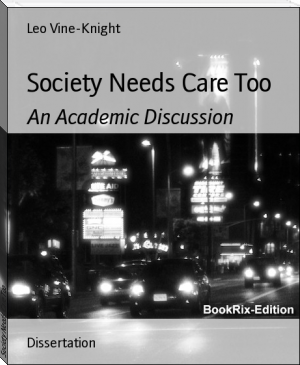Society Needs Care Too by Leo Vine-Knight (highly recommended books .TXT) 📖

Download in Format:
- Author: Leo Vine-Knight
Book online «Society Needs Care Too by Leo Vine-Knight (highly recommended books .TXT) 📖». Author Leo Vine-Knight
norms and values through outside social activities, one to one reminders, and group work. These norms and values should include self-respect, respect for others, rights and responsibilities in society, and the need to compromise and reciprocate. Interventions should include coaching in basic manners and social skills (e.g. please and thank you habits, turn-taking in conversation, shopping routines), role play on how to compromise and co-operate in social situations (e.g. making decisions, sorting out disputes, dividing work fairly), practising how to budget with money, and broader discussions on the reciprocal nature of society (e.g. why people work – to provide food, shelter, clothes etc.; why we should help – because we receive from others, because it gives a feeling of worth, and so on).
Service users should take personal responsibility for their rooms and appearance, and they could be involved with the day-to-day upkeep of the unit, using a domestic job roster agreed at community meetings. One to one therapy should develop individual constructive interests (e.g. cooking, gardening), and regular groups should be used to discuss basic work processes in society (e.g. food production, manufacturing, building, office work) with associated visits to increase understanding.
Day centre referrals should be included for low level training and re-socialisation activities, and mainstream further education centres should be used for more specific and progressive courses. Community based work experience should be accessed through local Health Trust and Social Service initiatives, the Learning Skills Council, and other similar organisations.
Interventions based on education, norms and values, and work would be essential for a realistic rehabilitation service, because without them service users would remain over-dependent and alienated. However, the family, media, and leisure institutions of society would also provide important opportunities for re-socialisation (e.g. improving family dynamics, discussing current affairs, visiting working museums etc.), while psychological, psychiatric and physical issues would remain significant, but not overpowering, factors.
Summary and Conclusion
This discussion has focused on the potential problems of orthodox patient-centred rehabilitation approaches in mental health settings in the U.K., proposing an alternative society-centred perspective.
It may be argued that the pendulum of individualized care and patient rights in mental health has now swung too far, and that it is in danger of leaving behind the communal principles of society at large, and the important rights of other groups - health care users elsewhere in the N.H.S. who are receiving under-financed care, rehabilitation practitioners who can make no headway with users who have simply ‘opted out’, and tax payers who blindly fund the often ineffective health care system (Halle and Day 2001). This reflects a much bigger problem in the U.K., where individualism has slowly eroded many of the communal principles on which a fair and democratic society should be based (Winship 1998).
It may now be time to revisit the ethics of a collective conscience, and to put increasing clinical emphasis on opting in, rather than out.
Society needs care too.
References
Department of Health, (1989). Caring for People – Community Care in the Next Decade and Beyond. London: H.M.S.O.
Department of Health. (1998). Our Healthier Nation: Modern, Dependable. London: H.M.S.O.
Glenister, D. and Hopton, J. (1995). The Illusion of Progress. Nursing Times. August 2nd.Vol.91.No.31.
Hadley, R. and Clough, R. (1997). Care in Chaos: Frustration and Challenge in Community Care. London: Cassell.
Halle, M. and Day, M. (2001). £10 Billion, That’s How Much N.H.S. Wastes of Your Money Every Year. The Daily Express. London: Express Newspapers.
Leighton, K. (2002). A Sociological Study of Bed Blocking in Psychiatric Rehabilitation Units. Journal of Psychiatric and Mental Health Nursing. Vol.9. No.4. August. pp. 447-457.
Leighton, K. (2003). A Social Conflict Analysis of Collective Mental Health Care: Past, Present and Future. Journal of Mental Health. Vol.12. No.5.Oct. pp.474-489.
Leighton. K. (2004). Anglo-American nursing theory, individualism and mental health care: a social conflict perspective. International Journal of Nursing Studies. Vol.41. January. pp.21-28.
Narayanasamy. A. (2002). The Access Model: A Transcultural Nursing Practice Framework. British Journal of Nursing. May 9-22. 11(9). pp.643-650.
Richmond, L. (1999). Work as a Spiritual Practice. London: Piatikus.
Robinson, J. (1991). Power, Politics and Policy Analysis in Nursing. In Perry A. and Jolley M. (Eds.) Nursing - A Knowledge Base for Practice. London: Edward Arnold.
Turner-Crowson, J. and Wallcraft, J. (2002). The Recovery Vision for Mental Health Services and Research: A British Perspective. Psychiatric Rehabilitation Journal. Winter. Vol.25.no.3. pp.245-254,
Webb C. (1991). Action Research. In Cormack D.F.S. (Ed.). The Research Process in Nursing. Oxford: Blackwell.
Winship, G. (1998). Democracy in Psychiatric Settings: Collectivism v. Individualism. In Barker P. and Davidson B. (Eds.). Psychiatric Nursing - Ethical Strife. London: Arnold.
Imprint
Service users should take personal responsibility for their rooms and appearance, and they could be involved with the day-to-day upkeep of the unit, using a domestic job roster agreed at community meetings. One to one therapy should develop individual constructive interests (e.g. cooking, gardening), and regular groups should be used to discuss basic work processes in society (e.g. food production, manufacturing, building, office work) with associated visits to increase understanding.
Day centre referrals should be included for low level training and re-socialisation activities, and mainstream further education centres should be used for more specific and progressive courses. Community based work experience should be accessed through local Health Trust and Social Service initiatives, the Learning Skills Council, and other similar organisations.
Interventions based on education, norms and values, and work would be essential for a realistic rehabilitation service, because without them service users would remain over-dependent and alienated. However, the family, media, and leisure institutions of society would also provide important opportunities for re-socialisation (e.g. improving family dynamics, discussing current affairs, visiting working museums etc.), while psychological, psychiatric and physical issues would remain significant, but not overpowering, factors.
Summary and Conclusion
This discussion has focused on the potential problems of orthodox patient-centred rehabilitation approaches in mental health settings in the U.K., proposing an alternative society-centred perspective.
It may be argued that the pendulum of individualized care and patient rights in mental health has now swung too far, and that it is in danger of leaving behind the communal principles of society at large, and the important rights of other groups - health care users elsewhere in the N.H.S. who are receiving under-financed care, rehabilitation practitioners who can make no headway with users who have simply ‘opted out’, and tax payers who blindly fund the often ineffective health care system (Halle and Day 2001). This reflects a much bigger problem in the U.K., where individualism has slowly eroded many of the communal principles on which a fair and democratic society should be based (Winship 1998).
It may now be time to revisit the ethics of a collective conscience, and to put increasing clinical emphasis on opting in, rather than out.
Society needs care too.
References
Department of Health, (1989). Caring for People – Community Care in the Next Decade and Beyond. London: H.M.S.O.
Department of Health. (1998). Our Healthier Nation: Modern, Dependable. London: H.M.S.O.
Glenister, D. and Hopton, J. (1995). The Illusion of Progress. Nursing Times. August 2nd.Vol.91.No.31.
Hadley, R. and Clough, R. (1997). Care in Chaos: Frustration and Challenge in Community Care. London: Cassell.
Halle, M. and Day, M. (2001). £10 Billion, That’s How Much N.H.S. Wastes of Your Money Every Year. The Daily Express. London: Express Newspapers.
Leighton, K. (2002). A Sociological Study of Bed Blocking in Psychiatric Rehabilitation Units. Journal of Psychiatric and Mental Health Nursing. Vol.9. No.4. August. pp. 447-457.
Leighton, K. (2003). A Social Conflict Analysis of Collective Mental Health Care: Past, Present and Future. Journal of Mental Health. Vol.12. No.5.Oct. pp.474-489.
Leighton. K. (2004). Anglo-American nursing theory, individualism and mental health care: a social conflict perspective. International Journal of Nursing Studies. Vol.41. January. pp.21-28.
Narayanasamy. A. (2002). The Access Model: A Transcultural Nursing Practice Framework. British Journal of Nursing. May 9-22. 11(9). pp.643-650.
Richmond, L. (1999). Work as a Spiritual Practice. London: Piatikus.
Robinson, J. (1991). Power, Politics and Policy Analysis in Nursing. In Perry A. and Jolley M. (Eds.) Nursing - A Knowledge Base for Practice. London: Edward Arnold.
Turner-Crowson, J. and Wallcraft, J. (2002). The Recovery Vision for Mental Health Services and Research: A British Perspective. Psychiatric Rehabilitation Journal. Winter. Vol.25.no.3. pp.245-254,
Webb C. (1991). Action Research. In Cormack D.F.S. (Ed.). The Research Process in Nursing. Oxford: Blackwell.
Winship, G. (1998). Democracy in Psychiatric Settings: Collectivism v. Individualism. In Barker P. and Davidson B. (Eds.). Psychiatric Nursing - Ethical Strife. London: Arnold.
Imprint
Publication Date: 11-10-2009
All Rights Reserved
Free ebook «Society Needs Care Too by Leo Vine-Knight (highly recommended books .TXT) 📖» - read online now
Similar e-books:





Comments (0)